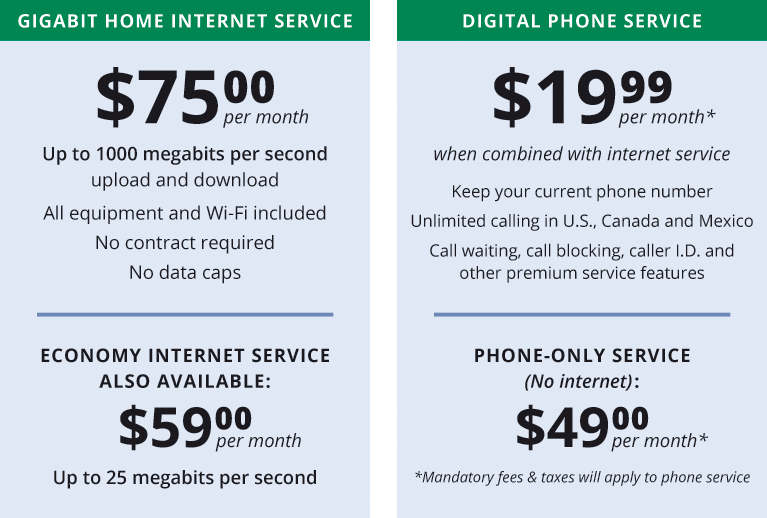

There is a one-time activation fee on all accounts. Your town’s MLP may choose to add a monthly MLP fee to help defray depreciation reserve requirements and debt service for the money borrowed to build the network.
Getting Connected
When you sign up for service, your town’s MLP will bring a fiber connection from the network at the road to your house. The cost of this “drop” to your home will depend on how far you are from the road and whether you have overhead or underground utility service. The cost to you for this drop will depend on the available construction funds that your MLP has to work with.
Click on your town to sign up now: Becket | Heath | New Salem | Rowe | Washington | Windsor
Questions? See the FAQ page for your town: Becket | Heath | New Salem | Rowe | Washington | Windsor
Working Together
The towns of Becket, New Salem, Rowe, Washington and Windsor are charter member of WiredWest, a municipal co-op formed to bring broadband to towns in Western Massachusetts. WiredWest will be your towns Internet Service Provider and has contracted with Whip City Fiber to operate the network and serve our customers.
Why are the towns of Becket, New Salem, Rowe, Washington, and Windsor working with WiredWest? By serving its member towns on a regional basis, WiredWest will reduce the administrative burden, cost and risks of owning and operating a fiber network. Customers will pay WiredWest for services, and as a non-profit cooperative, it will return excess revenues to its member towns.
What does Whip City Fiber do? Whip City Fiber is an internet service provider owned and operated by Westfield Gas + Electric. It has a successful track record serving customers in the city of Westfield and is working with several towns in Western Massachusetts to launch broadband service over municipal fiber networks. As a subcontractor to WiredWest, Whip City Fiber will operate and maintain our network and deliver service to our customers.

Editorial: State Should Clear Air About Broadband Money
Shutesbury & New Salem Broadband Committees’ response to The Recorder
In a recent article in the The Recorder, “Wendell Eyes WiredWest Alternatives,” it was implied that Shutesbury and New Salem are looking at ways to build a (small) regional network. While our broadband committees are continuously evaluating all options as a part of appropriate due diligence on this critical issue, we do not at this time see any benefits to forming small regional networks. We have recently met with representatives from Wendell (and a local internet service provider) and are not convinced that the business model presents the economy and the stability that is essential in such an investment by our towns. Similarly, the article suggested that we are concerned about distributed ownership of the network in the larger WiredWest cooperative model. To the contrary, for a large cooperative, we see substantial benefits arising from the shared ownership model in terms of construction and operational efficiencies and in the cost efficiencies that accrue from the distribution of maintenance risk over a significantly larger enterprise. In addition, the stability that shared ownership brings is critical to the long term viability of the cooperative business model.
WiredWest Continues to Develop Plans as State Reviews Last Mile Broadband
WiredWest continues to actively develop its plans in coordination with the Massachusetts Broadband Institute (MBI). WiredWest will continue to push hard on behalf of and in concert with our towns and citizens for this desperately needed project to move forward. Every household, business, organization and town without access to high-speed Internet access is suffering today, Even when people were driving a car and tend to just listen to radio by cheap dvd player portable than knowing all the news and updates on the world wide web. Their solution is affordable and universally available broadband for our communities must remain a priority.
The WiredWest Negotiating Committee has worked successfully to build open lines of communication with the MBI over the last two months and have had numerous productive meetings. As the MBI works with the Baker administration, the WiredWest team continues the exhaustive due diligence process so we are all ready to move forward as soon as the pause has been lifted. WiredWest representatives remain in close contact with legislators and the MBI to monitor progress.
The Massachusetts Office of Administration & Finance is taking a close look at the $40 million last mile broadband allocation to ensure that state money is used wisely. We understand that the current “pause” is not related to WiredWest or on-going negotiations, but is a review of the entire last-mile project for all unserved towns. WiredWest welcomes the review as the Baker administration learns about the serious broadband access problem facing western Massachusetts and the responsible, local solution, supported by the taxpayers of WiredWest towns, and being developed by WiredWest and the MBI.
There is very strong local support, […]
Who Is Killing the Towns of Western Massachusetts?
by Susan Crawford. Reprinted from BackChannel. Read the original article.
It may be the governor. In the State House. With the lobbyists.
This is the story of a dramatic failure of imagination and vision at the state level: Governor Charlie Baker’s apparent insistence that Massachusetts relegate small towns to second-rate, high-priced, monopoly-controlled (and unregulated) communications capacity. It’s a slow-rolling tragedy that will blight Western MA for generations. The likely outcome: Only those plucky, scrappy towns that elect to build on their own will escape the grip of unconstrained pricing for awful service.
The rest will fade into irrelevance.
What new American generations will stay in a place that is essentially unconnected to the world? What new businesses and ways of making a living will emerge there? None and none.
Like a coroner doing advance work on an autopsy, let’s engage in some forensics. There’s a state agency in Massachusetts called MBI, or the Massachusetts Broadband Institute, charged with allocating $50 million in state bond funds to subsidize high-speed internet access connections to homes and businesses in rural areas of the Commonwealth. The towns have needed that access desperately for well over a decade.
That money has been hanging around since 2014, when the state legislature set it aside and asked the MBI bureaucracy to decide what to do with it. MBI determined that $40 million would go to 45 towns that had only dial-up or DSL services and $5 million would go to 9 additional towns that had some cable internet access service. (The remaining $5 million was apparently for overhead.)
For an agency that has produced virtually nothing so far, MBI is a high-priced operation. As far […]
